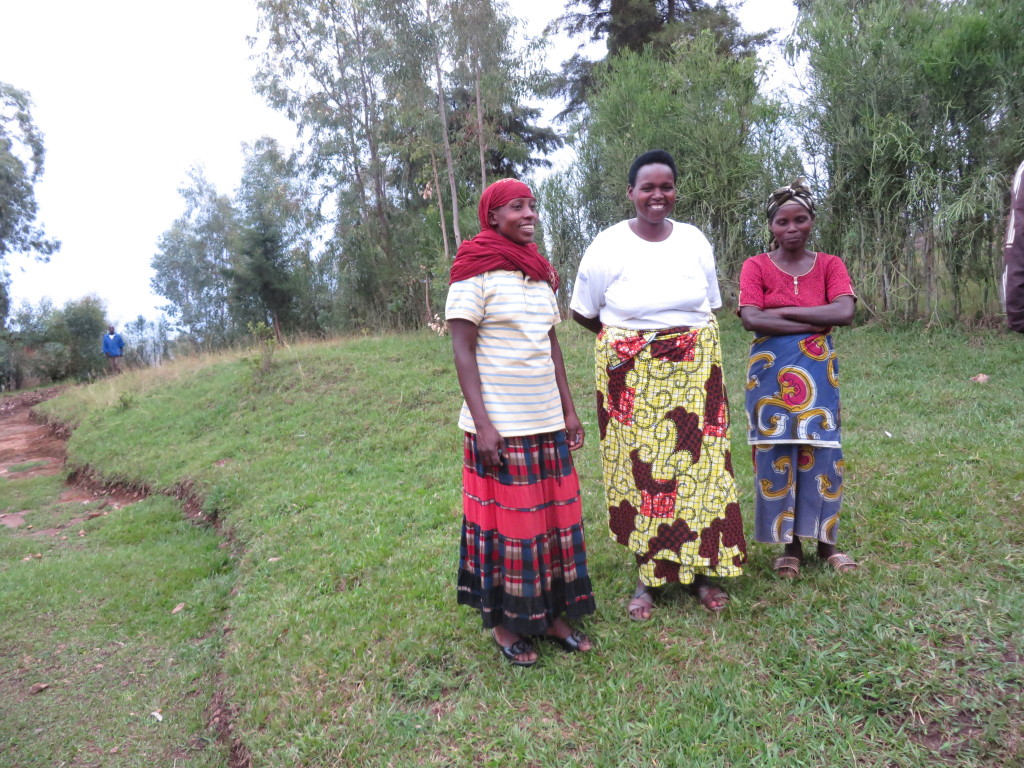The Common Ground Blog is an initiative of (Search for Common Ground), an international non-governmental organization (NGO), headquartered in Washington and Brussels, whose mission is to transform the way the world deals with conflict - away from adversarial confrontation towards cooperative solutions. (more info)
Radio inspires 2 women to strive for reconciliation in Rwanda
By Jean Baptiste Ndabananiye
“I listened to the program “Turi Umwe” and felt convinced that true pardon giving and requesting can restore unity among people.”- Mukamuhoza, a survivor of the Rwanda genocide.
“Turi Umwe,” is a USAID-funded radio broadcast aiming to promote and strengthen unity and reconciliation in the Rwanda. Search has also established listening clubs, throughout the country, that give people an opportunity to ask for and give pardon, with the goal of maximizing the impact of reconciliation in Rwanda.
Two weeks ago, I visited a listening club in the rural Mushubati Sector in west Rwanda. The club recently asked me to witness their work towards unity and reconciliation, something deemed nearly impossible in area.
As soon as I arrived, I spoke with Mukambonera Liberate, a genocide survivor. “There are people who killed such a lot of my people that I don’t know the number. My brother is one of those who killed others, whom I used to love too much. When I saw him, I instantaneously felt so traumatized that I suddenly took another way to avoid meeting him and he even did the same because of fearing me.”
I asked Mukambonera how her relationship is now.
“The situation has changed. This woman, Niyonemera from the listening club, has convinced me to change,’ she said.
I talked to Niyonemera to learn how she was able to change this sensitive situation. “Two Turi Umwe episodes motivated me to try until I help her because it used to shock me when I saw her traumatized. The episodes involved Giraneza John and Mudenge Boniface who actually exhibited unusual courage in unity and reconciliation. They fortified me highly,” she said.
Giraneza, a Tutsi genocide survivor whose beloved father was killed in the build up to the 1992 genocide, decided to marry a Hutu girl. He wanted his decision to become a model for other people to get committed to unity and reconciliation.
Mudenge Boniface was running for his life from 1992 to 1994 during the genocide against Tutsis. He noticed there are good Hutus and bad ones, just as there are good Tutsis as well as bad ones. While some Hutu church deacons wanted him dead, other Hutu deacons protected him. Mudenge says he has survived owing to the intervention of a lot of Hutus.
Niyonemera formed her beliefs, based on the broadcasts.
“I asked Mukambonera to listen to the program regularly. After listening, she was convinced to pardon her brother. She asked me to accompany her to go to her brother. I’d also persuaded him to ask for pardon, but it was Mukambonera who took the first initiative to reconcile with her brother,” said Niyonemera.
Mukambonera explains she has now developed a very good relationship with her brother, “A short time ago he invited me to the wedding of his child and I went there. This was a dream before.’
Niyonemera has also helped Mukambonera reconcile with another woman, Mukamuhoza, whose deceased husband plundered Mukambonera’s possessions in the genocide.
Niyonemera says there is another man she’s working with. “The man is still too malicious. Once he wounded his brother and the wife with a machete for the mere reason that his brother’s tree had fallen on his field of crops, then, damaging the crops. I told him he should change and he replied me God cannot pardon him for what he committed in the genocide, but I highly believe I’ll change him.”
To learn more about Search’s radio programs, click here.
_____________________________________
Jean Baptiste Ndabananiye is currently a program assistant with Search for Common Ground: Rwanda.
Related Posts
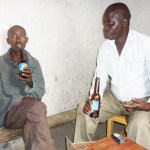 Two men, fifteen scars–one act of forgiveness
Two men, fifteen scars–one act of forgiveness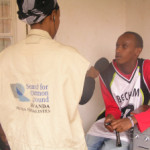 SEARCH FOR COMMON GROUND OP-ED IN THE PHILADELPHIA INQUIRER: A REMINDER OF RADIO’S POWER
SEARCH FOR COMMON GROUND OP-ED IN THE PHILADELPHIA INQUIRER: A REMINDER OF RADIO’S POWER Nepal: Woman radio host makes big splash over airwaves
Nepal: Woman radio host makes big splash over airwaves 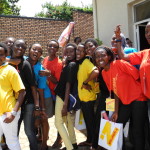 Inspiring “Nyampingas” in Rwanda Through Radio
Inspiring “Nyampingas” in Rwanda Through Radio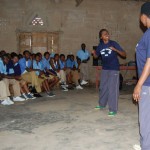 Tackling Conflict with Creativity
Tackling Conflict with Creativity Cycling helps young Rwandans Forget their Painful Pasts
Cycling helps young Rwandans Forget their Painful Pasts
from → Success Stories

